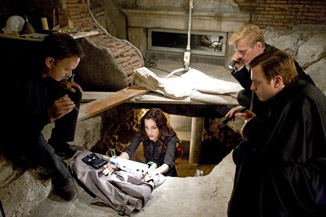|
|
Book vs. Movie: Angels & DemonsBy Russ BickerstaffMay 18, 2009
For all its difficulties, the film really excels at amplifying Brown's pacing. From the opening credits on, the film is hell bent on getting from point A to Point B and all the little points in between in just over two hours. All of Brown's pointless little factoids vaporize in a rush of events that is only slightly slower than the traditional summer action film. This has as much to do with the scoring as it does any other aspect of production - Hans Zimmer's score seems to be pushing things forward even in moments that would otherwise seem poignant and reflective. It may not have that much of an impact by the time it reaches the closing credits, but the Angels & Demons makes getting there reasonably fun. The Verdict In spite of its apparent desire to be something deeper, at its heart, the Angels & Demons story is an suspense thriller with just enough substance to keep it from seeming entirely pointless. Dan Brown's novel spends far too much time trying to justify itself intellectually to keep the kind of pace necessary for a really effective suspense thriller. While the film is similarly bogged-down in intellectual pretensions, the movie spends a lot less time talking and a lot more time moving. As a result, the film is far more effective at delivering on the kind of action and suspense that makes the story palatable. The screenwriters even improved on Brown's ponderous dialogue, making it sharper and more natural - so even the tedious exposition that Brown trudges his characters through speeds by pretty quickly. It may not be a great film, but it knows what it's doing a lot better than the book.
[ View other columns by Russ Bickerstaff ]
[ View other Book vs. Movie columns ]
[ Email this column ]
|

|
|
|

|
Friday, November 1, 2024
© 2024 Box Office Prophets, a division of One Of Us, Inc.


